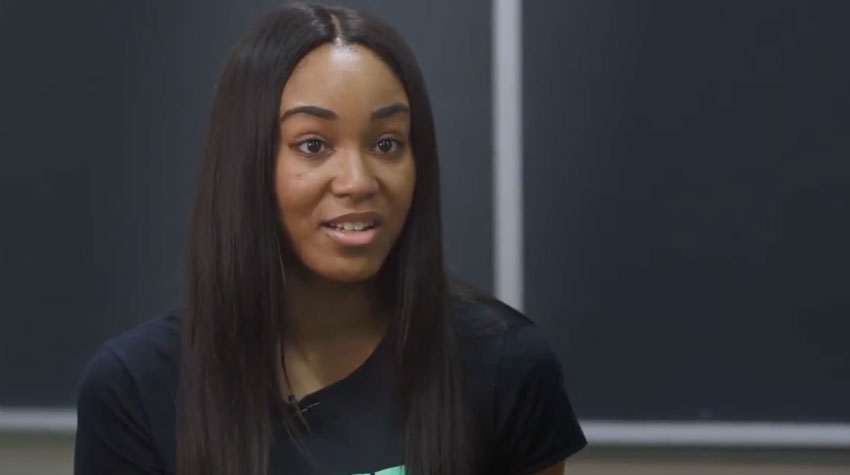Secondary Education
Overview
The newly redesigned secondary education program focuses on anti-racism and social justice. In response to the Illinois Professional Teaching Standards, this program utilizes the brand new Culturally Responsive Teacher and Leader Standards as they join Illinois in their collective effort to have the teaching force reflect the demographics of students in K-12 in the next four years.
This program is designed for students who have aspirations of being a high school teacher (professional educator license 9-12 in the state of Illinois). These students will have already started coursework in a major content area either at SIUE or a local community college. Students apply during the spring semester of their sophomore year to the two-year secondary education program.
What can I do with a degree in secondary education?
Students pursuing most majors in the College of Arts and Sciences and professional educator licensure through the School of Education, Health and Human Behavior are presented with two career pathways; that of their major area of study, and that of a career educator.
According to the U.S. Bureau of Education and the Illinois State Board of Education, the employment outlook is strong for high school teachers, both nationally and within the state through 2026. As is the case with all teacher education programs at SIUE, the secondary education program has an exceptional record of preparing highly effective teachers. Our graduates pursue careers as high school teachers across the country.
Equity and Inclusion for All Students
The secondary education program is designed to facilitate teacher-candidate understanding that teaching is essentially a social enterprise invested with moral responsibility and that, as teachers, they will be called to act as agents for social justice in their classrooms and in their schools. Through readings, activities and class discussions, teacher candidates will examine attitudes and behaviors which prevent classrooms, schools and society from being fair and equitable for all students and will develop a personal plan of action for providing meaningful and equitable educational opportunities for all of their students. The secondary education program helps students acquire the dispositions, cultural knowledge and competencies to adapt their curriculum and instructional skills for culturally responsive classroom practice.
The School of Education, Health and Human Behavior teacher education programs are dedicated to supporting all teacher education candidates regardless of their economic or social status and advocate for the rights of students free from discrimination based upon race, color, ethnic origin, national origin, creed, religion, political belief, sex, sexual orientation, gender identification, ability or age.
Professional Credential Disclosure
This program is intended to prepare students for licensure/certification meeting educational requirements established by regulatory boards in the state of Illinois. Licensure/certification requirements can vary by state. If you intend to practice or teach inside or outside the state of Illinois, please visit our professional licensure webpage.
Hands-on Learning/Faculty
Hands-on Learning
Secondary education students have opportunities to learn about school culture and gain teaching experience while interacting with students, school faculty, support personnel and administrators at various school sites while enrolled in the Secondary Education program.
Students attend seminars in each semester covering topics such as:
- Unit plan development
- Classroom management strategies
- Instructional planning and delivery.
During the student teaching semester, students are better prepared to successfully perform the teaching roles because of the support they receive from their cooperating teacher, department faculty and their respective content area faculty advisor.
Faculty
Faculty in the Department of Teaching and Learning instruct teacher candidates in pedagogical coursework. They are joined by faculty in the College of Arts and Sciences to collaboratively support preservice teachers to understand connections between theory and practice of pedagogical content knowledge in field placements.
Supervisors in the School of Education, Health and Human Behavior use pedagogical training and practical experience to support teacher candidates in making connections between theory and practice in field placements and in the classroom.
View current faculty
Redesigned Programming
Our newly redesigned program has added 15 credits of pedagogical content courses. The curriculum, which is rooted in the state of Illinois' Culturally Responsive Teaching and Leading Standards, can be best understood as a guided journey for our preservice teachers, who learn how to engage in a praxis of socially-just teaching. This journey is created through a strategically designed program of courses where preservice teachers forge a committed pathway to the praxis of social justice in education, which is reflected in our conceptual framework.
Please consult the corresponding College of Arts and Sciences program major page in the undergraduate catalog for specific details about the content major programming.
Curriculum Information
- CIED302 Field Experience II
- CIED310 Planning for Diverse Learners
- CIED312 Language and Communication in Multiple Contexts
- IT300 Digital Learning for Education
Semester 6 (spring)
- CIED303 Field Experience III
- CIED311 Planning for Differentiated Instruction
- CIED323 Adolescent Disciplinary Literacy
- SPE400 The Exceptional Child
Semester 7 (fall)
- CIED304 Field Experience IV
- CIED313 Introduction to Educational Assessment
- CIED314 Creating and Managing Effective Learning Environments
Semester 8 (spring)
- CIED455 Student Teaching Experience
- CIED456 Senior Seminar in Professionalism and Ethics of Teaching















